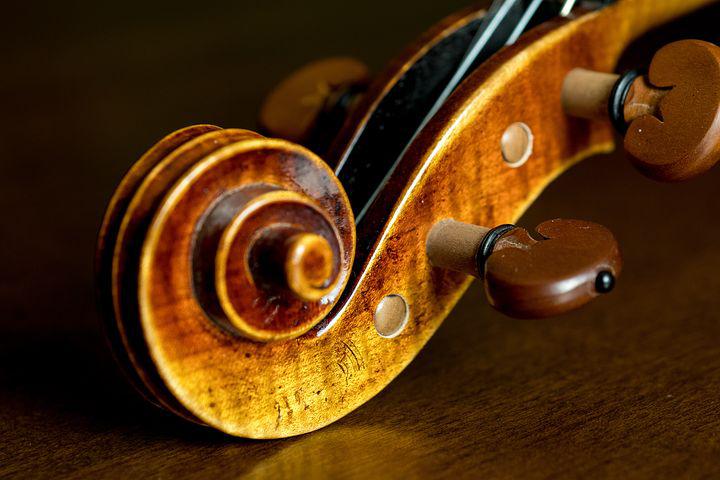I came to music late in life. When it came to choosing an instrument, I was advised that since I was already middle-aged (a euphemism for ‘very old’) I should choose a less popular instrument in order to increase my chances of ultimately ‘getting somewhere’. That immediately ruled out the violin, flute, and clarinet. The remaining choices boiled down to double bass, bassoon or viola. My husband, son, and son-in-law all play accoustic double bass, and we already had a houseful of these large instruments (plus stools), I wasn’t keen to add to that clutter. I experimented briefly with the bassoon, but was unable to make any sound blowing through its double reed. In the end my choice of the viola was pretty straightforward, despite a tongue-in-cheek description of it as ein pensions inztrument!
The viola is bigger than the violin, but it’s definitely not a ‘big violin’. The range of its notes sits between that of the violin and cello, and its timbre is deep and soulful. Because of its size, and the fact that it plays music written in a unique clef the viola is not an easy instrument to master. I began lessons with my kids’ violin teacher. In fact, I’m still having lessons! But now I’ve progressed to playing in orchestras, and I absolutely love it. There is something quite magical about the discipline and hierarchy of a symphony orchestra. Violas sit right in the centre, in the middle of the strings, and play the middle registers. Occasionally they are given achingly beautiful solos, but they are generally the orchestra’s middle-men, responsible for much of the rhythm and texture. As a late starter I sit at the back of the section, often just forward of the noisy brass. I can no longer read the music without my special music glasses, hence my view of a distant conductor is somewhat blurred—a physical inconvenience not usually appreciated by the ‘wunderkinds’ who occupy the front desks. The particular strength of the viola is fully revealed in chamber music where it has its own solo voice, and the physical logistics are easier to manage. Playing in a string quartet has become my favourite pastime.
Before taking up the viola I couldn’t read music, and learning to do so was a real slog. Music for the viola is written in the alto clef, so that’s the clef I started with, and it’s really the only one I with which I am totally comfortable. Whenever my particular line of music ascends into the higher reaches of the stave and the notation switches to treble clef, I have a slight frisson about the mental gymnastics required to transpose up or down by a whole tone. If you learn to do this at a young age, like players who start out on violin do, it becomes second nature—but it’s not that simple if your brain’s neural synapses are already hard-wired! Transposition between alto and treble clef is particularly annoying when the music notation weaves in and out between both clefs just so that the notes can be kept neatly on the stave. Remembering in which clef you’re playing becomes a bugbear.
If musical instruments were to be assigned personality types within the ancient Greco-Roman Four Temperaments (sanguine, melancholic, phlegmatic, choleric), which would represent the viola? The short answer is phlegmatic! Violas are most often unbiased peacemakers, calm, even-tempered listeners, generous providers of harmony, forgivers of mistakes, and invariably remain unoffended by the litany of jokes at their expense (indeed, they are often the best teller and collector of such jokes). If the orchestra were to be compared to a meal, and the Strings were to provide its libation, the cellos would be the wine bottle, violins the bottle’s label, but the wine itself ? Well, that would be us, violas!
My grown-up children who are now all proficient musicians will happily tell you that they have endured years of hearing dreadful viola practice, and that moreover, it’s still on the go! But, being ever the phlegmatic violist, I continue to accept frustrations, finger callouses and shoulder stiffness, and press on regardless. In terms of sheer enjoyment it continues to be worth all the effort involved.


Loving your blog Frith.
You give yourself wayy too little credit for your viola-playing prowess!
I remember the fun and giggles we had at orchestra – I’m surprised we weren’t chucked out. My viola playing days are over due to pinched nerves, but I remember those times with great affection.